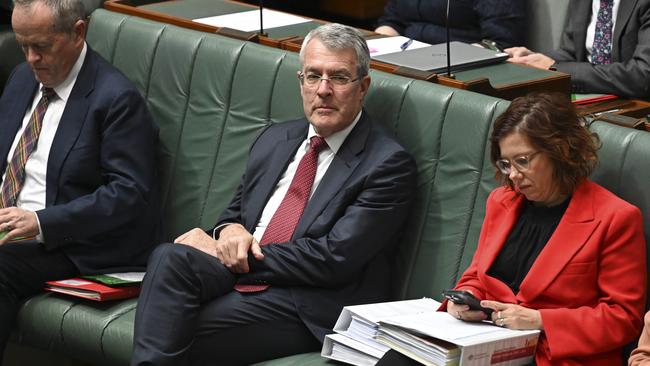New Labor Respect@Work bill ‘a class action lawyer’s meal ticket’
Discrimination class actions are expected to explode under a new bill which would see employers pick up the cheque for unmeritorious proceedings.

You can now listen to The Australian's articles. Give us your feedback.
Discrimination class actions are expected to explode under a Labor bill that would see employers pick up the cheque for unmeritorious proceedings, with critics arguing the legislation will be a “lawyer’s meal ticket” and further entrench Australia as one of the class action capitals of the world.
The bill, which is set to pass parliament any day now, has been widely panned by those who say the proposal protects applicants in sexual harassment and discrimination cases from paying the legal costs of their employer, even if they are largely unsuccessful in their claims.
But business leaders and the opposition have raised additional concerns that the proposal, drafted following former sex discrimination commissioner Kate Jenkins’ Respect@Work report, would also see “low-value and speculative” class action proceedings clogging up the court system.
This is especially in the wake of new findings that revenue for the litigation funding market has quadrupled to more than $200m and Australia has become the second largest forum for class action suits, trailing only the US.
“It is just becoming a huge moneymaker,” Australian Chamber of Commerce and Industry workplace director Jessica Tinsley said. “We are not just talking about a single applicant. What we are talking about is Australia taking on US-style class actions, and this bill becoming a new avenue for that sort of work.”
Class actions covered by the new legislation would not just be workplace related, Ms Tinsley said, but would go “much further than what Kate Jenkins recommended in her report”.
“The government has used the Respect@Work report as a basis, but they are going so much further than what Kate Jenkins recommended in her report, and going so far in favour of plaintiff law firms,” she said.
“It’s not just about employment; it’s across the board.”
Under the government’s proposal, courts will be unable to order an applicant to pay the respondent’s costs unless the claim is found to be vexatious or without reasonable cause, or that the applicant acted unreasonably and caused the other party to incur costs.
A business will also have to pay the full legal costs of the complainant even if only part of their case is upheld.
Ms Tinsley said while appropriate stakeholders were consulted as part of the process for the bill, “they haven’t made a single change as part of the inquiry that I can see”.

But UNSW Kingsford Legal Centre director Emma Golledge said there was a “real problem” in Australia where sexual harassment claims very rarely are brought to court, adding that the bill is “balanced and fair in the circumstances”.
“I don’t think we are going to see a floodgate situation,” she said. “Most people who experience sexual harassment are traumatised by it and don’t want to go through the court process.”
Victorian Legal Aid strategic litigation special adviser Melanie Schleiger agreed, saying “the bill also contains safeguards that enable courts to require applicants to pay the costs of the other side if their claims are vexatious or unreasonable”.
A Menzies Research Centre report released in July found Australia had become the second largest forum for class actions, with more than $1bn in class action settlements approved in the past financial year.
Opposition legal affairs spokeswomen Michaelia Cash said the bill “makes a mockery” of the Respect@Work report.
“This bill incentivises litigation and disincentivises negotiation, particularly for class action law firms,” she said, describing the proposal as “a class action lawyer’s meal ticket”.
“This is a bill that will entrench Australia as he class action capital of the world.”
The Law Council of Australia said the bill would “lessen the financial risks” involved in bringing class action litigation to court, which “may result in large numbers of applicants bringing unmeritorious and protracted litigation without sufficient incentives to ensure efficiency within the justice system”.
“For those representative actions to which the bill does apply, it is difficult to predict the effect on caseloads, as there are several factors other than the risks of adverse costs orders to consider in deciding whether to bring proceedings,” president Greg McIntyre SC told The Australian.
“Having said that, we noted in our submission that the changes in the bill could interfere with the courts’ discretion to award costs in the interests of justice, as well as with the efficient management (including settlement) of cases.”
A spokesperson for Attorney-General Mark Dreyfus said the opposition “continues to play politics and oppose important reform” having “sat on the Respect@Work report for almost a year without responding then refused to implement key recommendations”.
“This bill is the result of multiple rounds of consultations with all stakeholders, including business,” they said. “This includes a Senate inquiry and a separate review on the costs model contained in the bill conducted by the department.”






To join the conversation, please log in. Don't have an account? Register
Join the conversation, you are commenting as Logout